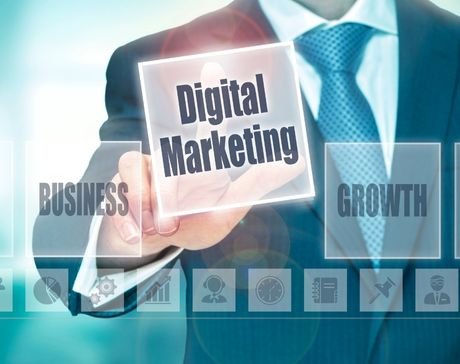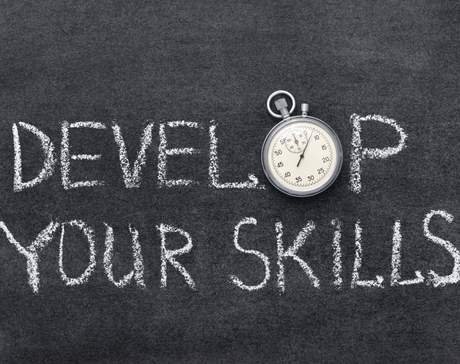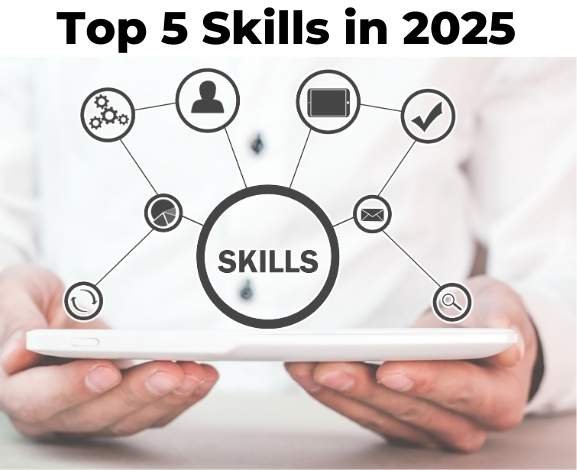Sharing is caring!
With this emerging world, the right skill could be the key to being valid and successful in one’s career. The world looks forward to 2025, when the job market can be expected to go through large-scale changes with new-coming technologies shaping the kind of workforce that the workplace will have in the decades to come. Future proofing your career by adopting the top 5 skills which high demand is crucial in your quest to remain ahead and competitive.
This article goes into the top 5 skills to enable you to navigate an ever-changing professional landscape. It’s about upskilling or just graduating, and no matter your position, this set of skills will differentiate you in a competitive marketplace. This guide covers technical skills like AI and data analytics and soft skills, including emotional intelligence.
Don’t stagnate or let your career become obsolete. Master your way forward and ensure a secure future by staying on top of the curve. Dive in, as here is how to future-proof your career!
Table of Contents
Skill 1: Artificial Intelligence and Machine Learning (AI & ML)
Why AI and ML Are Crucial
Artificial Intelligence (AI) and Machine Learning (ML) have transitioned from being futuristic buzzwords to becoming essential components of the modern workplace. These technologies are reshaping industries by automating tasks, enhancing efficiency, and driving innovation. By 2025, jobs requiring AI and ML skills are expected to grow by 71% globally, according to the World Economic Forum.
Applications of AI and ML Across Industries
- Healthcare: Predictive algorithms assist in early disease diagnosis, improving patient outcomes.
- Retail: AI-driven personalization enhances customer experiences and increases sales.
- Finance: ML models efficiently detect fraud, safeguarding financial systems.
- Transportation: Innovations like self-driving cars and smart traffic systems revolutionize mobility.
How to Develop AI & ML Expertise
- Take Structured Courses: Enroll in platforms like Coursera, edX, or Fast.ai for foundational and advanced learning.
- Focus on Programming: Master languages and tools like Python, TensorFlow, and Scikit-learn to build ML models.
- Participate in Competitions: Engage with platforms like Kaggle to solve real-world challenges and refine your skills.
Real-Life Success Story
Maria, an operations manager, upskilled herself by completing an AI course online. She applied predictive analytics to her company’s supply chain, reducing costs by 25%. Her innovation led to recognition within her organization and a promotion to a leadership role.
Skill 2: Data Analytics and Interpretation
The Role of Data in Decision-Making
In today’s data-driven world, businesses rely on insights from big data to make informed decisions. The ability to analyze and interpret data is a critical skill that will remain in high demand in 2025. Data analytics enables companies to uncover trends, predict outcomes, and develop personalized strategies that drive success.
Key Tools and Techniques to Learn
To excel in data analytics, mastering the following tools and techniques is essential:
- Statistical Analysis: Grasp key concepts like mean, median, standard deviation, and regression models to interpret datasets effectively.
- Visualization Tools: Develop proficiency in tools like Tableau, Power BI, and Google Data Studio to present insights visually.
- Programming for Data: Learn Python, R, and SQL to handle and analyze complex datasets with precision.
Industries Benefiting from Data Analytics
- Marketing: Companies use analytics to understand customer behavior and design impactful, targeted campaigns.
- Sports: Teams analyze player performance and game strategies to optimize results.
- Agriculture: Farmers apply data-driven insights to maximize crop yields and manage resources efficiently.
Real-Life Success Story
Jack, a financial analyst, leveraged historical data to forecast market trends during a volatile economic period. His accurate predictions helped his firm increase portfolio returns by 15%, earning him recognition for his data-driven approach.
Skill 3: Digital Marketing and SEO

Why Digital Marketing Is in High Demand
The digital revolution has transformed how businesses engage with their audiences. By 2025, digital marketing will dominate as brands compete for online visibility and customer loyalty. Search Engine Optimization (SEO) plays a pivotal role in ensuring websites rank higher on search engines, while targeted ads help drive traffic and boost conversions. As businesses prioritize their digital presence, skilled marketers will be indispensable.
Core Areas to Focus On
To excel in digital marketing, focus on these critical areas:
- Content Marketing: Create compelling and value-driven content that resonates with your audience.
- Social Media Marketing: Leverage platforms like Instagram, LinkedIn, and TikTok to increase brand awareness and foster community engagement.
- Search Engine Optimization: Master technical SEO, keyword research, and link-building techniques to improve search engine rankings.
How to Gain Expertise in Digital Marketing
- Enroll in Courses: Pursue certifications from platforms like Google, HubSpot, or SEMrush to build a solid foundation.
- Experiment with Ads: Start small-budget campaigns on Google Ads or social media platforms to gain hands-on experience.
- Track Metrics: Use analytics tools such as Google Analytics and Facebook Insights to measure ROI and optimize campaigns effectively.
Real-Life Success Story
Amelia, a freelance digital marketer, helped her clients double their web traffic by optimizing their blogs and running high-performing ad campaigns. Her expertise in SEO and targeted ads positioned her as a sought-after consultant, transforming her freelance career into a thriving business.
Skill 4: Remote Collaboration and Communication

The Remote Work Paradigm
The COVID-19 pandemic revolutionized the way we work, with remote work becoming a cornerstone of professional life. By 2025, research by Ladders predicts that at least 25% of all professional jobs in North America will be remote. Thriving in this flexible work environment requires mastering remote collaboration and communication skills, ensuring seamless teamwork across geographies and time zones.
Tools for Remote Collaboration
To succeed in remote work, familiarize yourself with these essential tools:
- Communication: Platforms like Slack, Microsoft Teams, and Zoom enable real-time discussions and virtual meetings.
- Project Management: Tools such as Trello, Asana, and Jira help track project progress and deadlines.
- Cloud Sharing: Services like Google Drive and Dropbox facilitate easy sharing and collaboration on documents.
Strategies to Improve Remote Work Skills
- Set Clear Expectations: Define roles, responsibilities, and deadlines to ensure everyone is aligned.
- Enhance Written Communication: Use concise, professional language in emails, reports, and team chats to avoid misunderstandings.
- Adapt to Time Zones: Learn to work asynchronously, leveraging tools and clear documentation to collaborate effectively with global teams.
Real-Life Success Story
A multinational IT firm faced challenges coordinating its global workforce. By adopting virtual collaboration best practices—weekly check-ins, streamlined tools, and clear communication protocols—the company improved productivity by 35%.
Skill 5: Emotional Intelligence (EI) and Leadership
Why Emotional Intelligence Matters
As automation and technology reshape industries, emotional intelligence (EI) remains a critical differentiator for professionals. EI enables individuals to understand and manage their own emotions while empathizing with others, fostering collaboration and trust. When paired with strong leadership skills, EI becomes a powerful tool for guiding teams through challenges and achieving shared objectives. In 2025, organizations will increasingly value leaders who can combine emotional insight with strategic vision.
Components of Emotional Intelligence
- Self-Awareness: Recognize your strengths, weaknesses, and emotional triggers to navigate situations effectively.
- Empathy: Understand and respect diverse perspectives, fostering inclusivity and stronger team dynamics.
- Social Skills: Build rapport, communicate effectively, and resolve conflicts to maintain a harmonious workplace.
How to Enhance Leadership Abilities
- Mentorship: Learn from experienced leaders who can provide insights and guidance to hone your leadership style.
- Team Building: Develop experience managing diverse teams, resolving conflicts, and motivating others toward common goals.
- Continued Learning: Attend leadership workshops, seminars, or online courses to stay updated on best practices.
Real-Life Success Story
A startup CEO recognized the importance of emotional intelligence in the workplace. By fostering a culture of trust, transparency, and open communication, they significantly improved employee morale and reduced turnover rates. This focus on EI and effective leadership resulted in a 40% increase in overall productivity and team satisfaction.
How to Acquire and Develop These Skills

The job market is evolving rapidly, and mastering the top 5 skills for 2025 is essential to stay competitive. Whether you’re an experienced professional or just starting your career, adopting a structured approach to skill development can help you succeed. Here’s a comprehensive guide to acquiring the top 5 skills that employers will prioritize in the near future.
1. Identify Your Strengths and Weaknesses
To master the top 5 skills, start with a self-assessment. Tools like a SWOT analysis (Strengths, Weaknesses, Opportunities, and Threats) can help you identify which skills to prioritize. For example, if you’re already proficient in data analytics but lack expertise in emotional intelligence, shift your focus to interpersonal skills to round out your abilities.
2. Create a Learning Plan
A learning plan is crucial for developing the top 5 skills efficiently. Set realistic, time-bound goals. For instance:
- Complete a foundational AI and machine learning course in three months.
- Attend monthly webinars on remote collaboration tools.
- Practice public speaking biweekly to improve communication.
Breaking down your objectives into smaller milestones helps you track progress and stay motivated.
3. Use Online Resources
Online platforms are invaluable for building the top 5 skills. Websites like Coursera, LinkedIn Learning, and Skillshare offer curated courses taught by industry experts. Additionally, free resources such as YouTube tutorials and professional blogs provide insights into emerging trends and practical tips to master the top 5 skills.
4. Network Actively
Networking plays a vital role in developing the top 5 skills. Join professional groups, participate in webinars, and engage in industry-specific forums. Networking not only provides learning opportunities but also connects you with mentors who excel in the top 5 skills you wish to acquire.
5. Practice, Practice, Practice
Mastering the top 5 skills requires hands-on experience. Internships, freelancing, and volunteer projects are excellent ways to apply your knowledge. For example, enhance your data analytics skills by working on small-scale projects, or improve your leadership abilities by managing a community initiative. or improve your leadership abilities by leading community initiatives.
The Impact of These Skills on Career Growth
Mastering the top 5 skills for 2025 is not just a way to stay relevant—it’s a game-changer for career growth. Employers increasingly value professionals with a diverse set of competencies, blending technical expertise with interpersonal abilities. Let’s explore how the top 5 skills can significantly enhance your career prospects and open doors to exciting opportunities.
Increase Employability
Employers are actively seeking candidates who have mastered the top 5 skills. These include artificial intelligence, data analytics, digital marketing, remote collaboration, and emotional intelligence. By showcasing your proficiency in these areas, you position yourself as a versatile and valuable asset to any organization. According to a LinkedIn study, 87% of hiring managers prioritize skill-based hiring, highlighting the growing importance of the top 5 skills over traditional qualifications.
Drive Career Advancement
Professionals who focus on developing the top 5 skills often climb the career ladder faster. Leadership roles demand not only technical expertise but also emotional intelligence and strong communication abilities. For instance, a manager adept at remote collaboration and data-driven decision-making is better equipped to lead diverse, global teams.
Boost Earnings
The top 5 skills are directly linked to higher earning potential. Fields like AI, machine learning, and data analytics command premium salaries as companies strive to stay ahead in a tech-driven world. Similarly, digital marketing and SEO experts are in demand as businesses compete for online visibility. Mastering these top 5 skills can significantly enhance your financial rewards.
Real-Life Success
Many professionals have transformed their careers by focusing on the top 5 skills. For example, data analysts with AI expertise are leveraging their knowledge to secure top-tier roles with competitive salaries. Similarly, marketers skilled in SEO and social media are driving business growth and gaining recognition.
Real-Life Examples of Professionals Who Have Mastered These Skills
Mastering the top 5 skills for 2025 has transformed the careers of countless professionals, enabling them to achieve extraordinary success. These real-life examples showcase how individuals across industries have leveraged these skills to innovate, lead, and excel.
AI & ML Innovators
Artificial intelligence and machine learning are at the forefront of the top 5 skills, and many professionals are making groundbreaking contributions. For example, engineers have developed self-learning algorithms that revolutionize healthcare diagnostics, enabling faster and more accurate disease detection. Their mastery of these top 5 skills has positioned them as leaders in technology, earning them recognition and lucrative career opportunities.
Data Analysts
Data analytics, another critical component of the top 5 skills, has empowered marketing professionals to make data-driven decisions. For instance, one analyst used advanced data interpretation techniques to double their company’s ROI by crafting targeted campaigns. This achievement not only drove business growth but also earned the professional a promotion and a substantial salary increase.
Digital Marketing Experts
Digital marketing and SEO are integral to the top 5 skills for anyone looking to thrive in the digital economy. Entrepreneurs have successfully scaled their e-commerce businesses by mastering SEO strategies and running high-converting online ad campaigns. These top 5 skills allowed them to expand their customer base and increase revenue exponentially.
Remote Leaders
Remote collaboration and communication are vital in today’s globalized workforce, making them essential parts of the top 5 skills. Managers adept at these skills have led global teams to achieve record-breaking project milestones. By leveraging tools and strategies for virtual collaboration, they’ve streamlined workflows and boosted productivity.
Emotionally Intelligent Leaders
Emotional intelligence and leadership are among the most impactful of the top 5 skills. Executives with high emotional intelligence have transformed toxic work cultures into thriving, harmonious environments. Their ability to understand and address team dynamics has resulted in higher employee satisfaction and improved overall performance.
Conclusion: Take Charge of Your Future Career Success
The world of work is evolving faster than ever, and the professionals who thrive in 2025 will be those who have adapted to change by mastering the top 5 skills. These skills—artificial intelligence, data analytics, digital marketing, remote collaboration, and emotional intelligence—are essential for staying relevant and competitive in the future workforce.
As automation reshapes industries and remote work becomes the norm, mastering the top 5 skills will not only make you a valuable asset to employers but also position you for long-term career success. Companies are seeking professionals who combine technical expertise with the ability to lead, collaborate, and adapt. By developing these competencies, you ensure that your career remains resilient in the face of rapid change.
Investing in your personal and professional development is the first step toward securing your future. Start by identifying which of the top 5 skills you need to improve. Take advantage of online courses, networking opportunities, and hands-on experiences to build your expertise. Begin small—perhaps with an introductory AI course or by enhancing your emotional intelligence through self-awareness exercises. Consistency is key.
Remember, the journey to mastering the top 5 skills is not an overnight process. It requires dedication and a proactive mindset. However, the rewards are immense. Professionals who invest in these skills often find themselves in leadership roles, earning higher salaries, and making a significant impact in their industries.
The future belongs to those who are prepared, and the time to prepare is now. Take charge of your career by embracing the top 5 skills that will define success in 2025 and beyond. Stay ahead of the curve, and watch your career soar to new heights. Your future is in your hands—start building it today!
